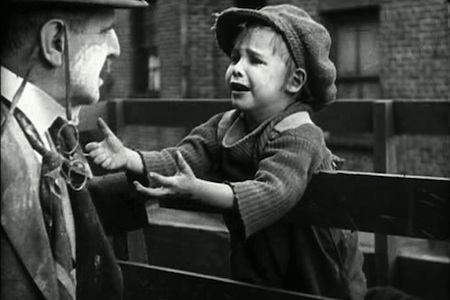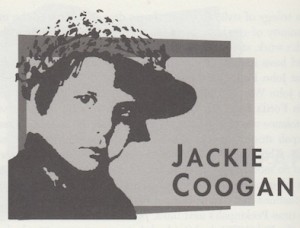Born: October 26, 1914, Los Angeles, CA
Died: March 1, 1984, Santa Monica, CA
The boy was one of the miracles of the movies.
—Kevin Brownlow
The ambition of a stage mother both created and destroyed the film career of Jackie Coogan. His parents had placed the talented youth in vaudeville stage shows at an early age. One day while passing a restaurant, the Coogans noticed screen star Charlie Chaplin exiting a side door and approached with little Jackie in tow. They introduced the child to Chaplin and invited the famous comedian to an afternoon performance. When he saw the precocious six-year-old hamming it up on stage later that day, Chaplin was captivated.
A child with a sparkling countenance, Jackie first appeared in a film when he was eighteen months old, sitting patiently through Skinner’s Baby (1916). When Chaplin gave him a brief screen role in A Day’s Pleasure (1919), featured alongside the Little Tramp character, he was impressed by how Coogan handled his suggestions and immersed himself in a scene. Chaplin believed the youth had a future and decided to feature Jackie in his next film.
Chaplin’s The Kid premiered in New York City in January 1920 to packed houses and made Coogan a household name. It was a highly anticipated event and soon became the all-time box-office leader, surpassing D.W. Griffith’s The Birth of a Nation. In the film, Coogan’s sad-eyed waif upstaged Chaplin with a tremendous range of emotions that seemed beyond a child of his age. He was hailed as a new sensation. Coogan’s parents complained that despite the huge receipts from the film, they received nothing. Chaplin, who despised the forthright Mrs. Coogan, offered to secure a position for Jackie’s father at the First National studio at an inflated salary.
Meanwhile, Jackie Coogan went to work on other First National productions, including the popular Peck’s Bad Boy (1921). Like all Chaplin protégés, Coogan was seen internationally, so his following was immense. He performed in a number of young adult roles based on literary classics—Oliver Twist (1922), Little Robinson Crusoe (1924), Tom Sawyer (1930) and Huckleberry Finn (1931).
It’s hard to exaggerate the success of Jackie Coogan. His fame made him the first major Hollywood child star, a crown he would carry for twenty-three films over a lucrative ten-year period. In 1923, his parents decided to switch studios from First National to MGM, where they agreed to a historic contract that provided a signing bonus of $500,000, an additional $22,000 a week as salary and a 60 percent stake in the profits from all his films, the first being the appropriately titled Long Live the King (1923). Little Jackie was suddenly one of the highest-paid stars in Hollywood. He became a millionaire before Shirley Temple was even born.
His entire life became front-page news, and a well-publicized haircut was filmed for posterity in Johnny Get Your Hair Cut (1927). With puberty came declining popularity, and by the mid-thirties he was washed up. He tried many comeback attempts but never completely succeeded. In 1935, an auto accident claimed his father’s life and killed three others; Jackie was in the car at the time, but survived. The tragedy indirectly caused the landmark legal decision that forever protected the rights of child actors.
Coogan’s widowed mother married Arthur Bernstein, a friend of the family and formerly Coogan’s business manager. Jackie suspected that the newlyweds were frivolously spending his fortune, so in 1938, at the age of twenty-four, he asked his parents for a portion of the $4 million he had amassed as a star. His new stepfather refused. Coogan sued to collect, but a loophole in the law enabled the couple to whittle away his childhood earnings before the courts settled the dispute. By the time the trial started, the sum had dipped to just $700,000. Coogan was awarded half and, after paying his legal fees, collected less than $250,000.
However, as a result of the case the California legislature passed the Child Actors Bill, designed to protect the assets of child stars; it is commonly referred to as the Coogan Act. Thanks to Coogan, young movie actors’ income is managed by the court and financial specialists.
He married the leggy Betty Grable in 1937, but had to struggle to support her, and they were divorced just three years later, in part because of the intense emotional strain from the trial. Coogan was effectively blackballed in the film business by his stepfather, a popular and powerful producer. After army service in World War II, Coogan kicked around film lots but found greater success in television as the perpetual optimist Uncle Fester on The Addams Family.
In the mid-1970s, Coogan was instrumental in the re-release of Oliver Twist, a film that had been lost for fifty years. A negative print with no intertitles had been recovered in Yugoslavia. The film, starring horror icon Lon Chaney as Fagin and Coogan as Oliver, was edited together with the assistance of Coogan’s recollections and released to the home video market. It contains moments of stunning poignancy thanks to a child star whose tribulations resulted in the legal precedent that protects all young actors to this day.
To read all the republished articles from ‘The Film 100,’ go to Reintroducing the Film 100 here on Keyframe.





